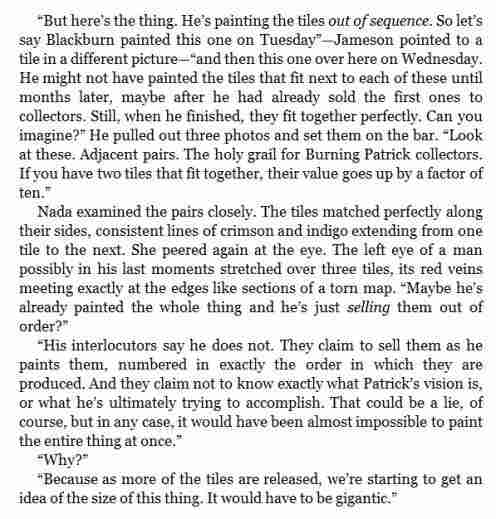See Burning Patrick.
See as well Night of Lunacy.
In memory of a retired co-director of Galerie St. Etienne
who reportedly died on October 17 . . .
"It is… difficult to mount encyclopedic exhibitions
without an overarching art-historical narrative…."
— Jane Kallir, director of Galerie St. Etienne, in
https://www.tabletmag.com/jewish-arts-and-culture/
visual-art-and-design/269564/the-end-of-middle-class-art
An overarching narrative from the above death date —
See as well the previous post
and "Dancing at Lughnasa."
Notes on Mathematics and Narrative
Background—
Commentary on The Wicker Man—
Originally The Wicker Man was not well-received by critics in the UK. It was considered
to be bizarre, disturbing, and uncomfortable, with the hasty editing making the story confusing
and out of order…. Today this movie is considered a cult classic and has been called
the “Citizen Kane of horror films” by some reviewers. How did this film become a cult classic?
Real estate motto— Location, Location, Location.
Illustration— The fire leap scene from Wicker Man, filmed at Castle Kennedy—

In today's New York Times, Michiko Kakutani reviews a summer thriller
by Kevin Guilfoile. The Thousand is in the manner of Dan Brown's
2003 The Da Vinci Code or of Katherine Neville's 1988 The Eight .
From the review—
What connects these disparate events, it turns out, is a sinister organization
called the Thousand, made up of followers of the ancient Greek mathematician
and philosopher Pythagoras (yes, the same Pythagoras associated with
the triangle theorem that we learned in school).
As Mr. Guilfoile describes it, this organization is part Skull and Bones,
part Masonic lodge, part something much more twisted and nefarious….
The plot involves, in part,
… an eccentric artist’s mysterious masterwork, made up of thousands of
individually painted tiles that may cohere into an important message….
Not unlike the tiles in the Diamond Theory cover (see yesterday's post)
or, more aptly, the entries in this journal.

A brief prequel to the above dialogue—

In lieu of songs, here is a passage by Patrick Blackburn
more relevant to the art of The Thousand—
See also the pagan fire leaping in Dancing at Lughnasa.
Godmother and Cinderella

Meryl Streep and Amy Adams in "Julie & Julia"
The image is from gossipsauce.com on August 2, 2009.
For a darker Godmother/Cinderella pair,
see the film discussed in this journal
on that same date (Lughnasa 2009).
A thought from Pynchon's Against the Day quoted here on Groundhog Day a year ago today—
“We thus enter the whirlwind. It becomes the very essence of a refashioned life, providing the axes to which everything will be referred. Time no long ‘passes,’ with a linear velocity, but ‘returns,’ with an angular one…. We are returned to ourselves eternally, or, if you like, timelessly.”
“Born again!” exclaimed a Christer in the gathering, as if suddenly enlightened.
Summer of ’36
Another Opening
of Another Show
“When I cast my mind back to that summer of 1936 different kinds of memories offer themselves to me. We got our first wireless set that summer– well, a sort of a set; and it obsessed us. And because it arrived as August was about to begin, my Aunt Maggie– she was the joker of the family– she suggested we give it a name. She wanted to call it Lugh after the old Celtic God of the Harvest. Because in the old days August the First was La Lughnasa, the feast day of the pagan god, Lugh; and the days and weeks of harvesting that followed were called the Festival of Lughnasa.”
From the film “Contact”–
Jodie Foster and the
opening of the 1936 Olympics
| “Heraclitus…. says: ‘The ruler whose prophecy occurs at Delphi oute legei oute kryptei, neither gathers nor hides, alla semainei, but gives hints.'” — An Introduction to Metaphysics, by Martin Heidegger, Yale University Press paperback, 1959, p. 170 |

|
"Credences of Summer," VII,
by Wallace Stevens, from
"Three times the concentred |
Lughnasa — An Irish harvest festival.
"It was usually celebrated on the nearest Sunday to August 1st." —Chalice Centre
Related material:
Room 1010
Continuing the hotel theme of the previous entry….
John Gregory Dunne has a letter in the New York Review of Books of December 20 (St. Emil's Day in the previous entry), 1990. In this letter, he reveals that he and his wife had at one time worked on a Grand Hotel screenplay based in Las Vegas.
For related material in memory of Dunne, see In Lieu of Rosebud, which contains entries for 10/10-10/12, 2002.
Mein Irisch Kind,
Wo weilest du?
Dancing at Lughnasa
“The place outside the cosmos where I and my pals do our nursing job I simply call the Place. A lot of my nursing consists of amusing and humanizing Soldiers fresh back from raids into time. In fact, my formal title is Entertainer….”
— Fritz Leiber, The Big Time
“And he sang:
‘Dance a little closer to me,
Dance a little closer now,
Dance a little closer tonight.
Dance a little closer to me,
hey it’s closing time,
And love’s on sale tonight
at this five and dime.’ “
— “Love at the Five and Dime,”
written and sung by Nanci Griffith
“Going up.” — Nanci Griffith
Powered by WordPress